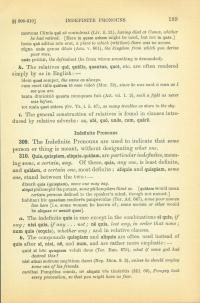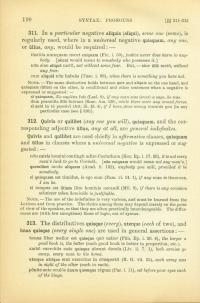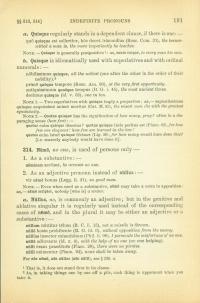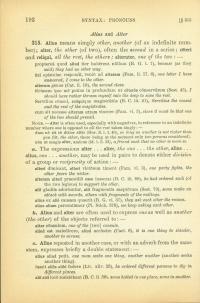309. The indefinite pronouns are used to indicate that some person or thing is meant, without designating what one.
310. Quis, quispiam, aliquis, quīdam, are particular indefinites, meaning some, a certain, any. Of these, quis (any one) is least definite, and quīdam (a certain one) most definite; aliquis and quispiam (some one) stand between the two.
dīxerit quis (quispiam)
some one may say
aliquī philosophī ita putant
some philosophers think so
[quīdam would mean certain persons defined to the speaker's mind, though not named.]
habitant hīc quaedam mulierēs pauperculae (Ter. Ad. 647)
some poor women live here
[i.e. some women he knows of; some women or other would be aliquae or nesciō quae].
a. The indefinite quis is rare except in the combinations sī quis (if any), nisi quis (if any . . . not), nē quis (lest any, in order that none), num quis (ecquis whether any) and in relative clauses.
b. The compounds quispiam and aliquis are often used instead of quis after sī, nisi, nē, and num, and are rather more emphatic.
Quid sī hōc quispiam voluit deus? (Ter. Eun. 875)
What if some god had desired this?
nisi alicui suōrum negōtium daret (Nep. Dion. 8.2)
unless he should employ some one of his friends
Cavēbat Pompêius omnia, nē aliquid vōs timērētis. (Mil. 66)
Pompey took every precaution, so that you might have no fear.
311. In a particular negative aliquis and aliquī (some one, some), are regularly used, where in a universal negative quisquam (any one) or ūllus (any) would be required.
Iūstitia numquam nocet cuiquam. (Fin. 1.50)
Justice never does harm to anybody.
[alicui would mean to somebody who possesses it.]
nōn sine aliquō metū
not without some fear
BUT
sine ūllō metū
without any fear
cum aliquid nōn habeās (Tusc. 1.88)
when there is something you do not have
Note— The same distinction holds between quis and aliquis on the one hand, and quisquam (ūllus) on the other, in conditional and other sentences when a negative is expressed or suggested.
Sī quisquam, ille sapiēns fuit. (Lael. 9)
If any man was (ever) a sage, he was.
dum praesidia ūlla fuērunt (Rosc. Am. 126)
while there were any armed forces
sī quid in tē peccāvī (Att. 3.15.4)
if I have done wrong towards you
[in any particular case, see § 310, above]
312. Quīvīs or quīlibet (any one you will), quisquam, and the corresponding adjective ūllus (any at all) are general indefinites. Quīvīs and quīlibet are used chiefly in affirmative clauses, quisquam and ūllus in clauses where a universal negative is expressed or suggested.
Nōn cuivīs hominī contingit adīre Corinthum. (Hor. Ep. 1.17.36)
It is not every man's luck to go to Corinth.
[nōn cuiquam would mean not any man's.]
quemlibet modo aliquem (Acad. 2.132)
anybody you will, provided it be somebody
Sī quisquam est timidus, is ego sum. (Fam. 6.14.1)
If any man is timorous, I am he.
sī tempus est ūllum iūre hominis necandī (Mil. 9)
if there is any occasion whatever when homicide is justifiable
Note— The use of the indefinites is very various, and must be learned from the Lexicon and from practice. The choice among them may depend merely on the point of view of the speaker, so that they are often practically interchangeable. The differences are (with few exceptions) those of logic, not of syntax.
313. The distributives quisque (every), uterque (each of two), and ūnus quisque (every single one) are used in general assertions.
Bonus liber melior est quisque quō mâior. (Plin. Ep. 1.20.4)
The larger a good book is, the better. (each good book is better in proportion, etc.)
Ambō exercitūs suās quisque abeunt domōs. (Liv. 2.7.1)
Both armies go away, every man to his home.
Uterque utrīque erat exercitus in cōnspectū. (B. G. 7.35)
Each army was in sight of the other. (each to each)
Pōnite ante oculōs ūnum quemque rēgum. (Par. 1.11)
Set before your eyes each of the kings.
a. Quisque regularly stands in a dependent clause, if there is one.
Quō quisque est sollertior, hōc docet īrācundius (Rosc. Com. 31)
The keener witted a man is, the more impatiently he teaches.
Note— Quisque is generally postpositive.1
suum cuique
to every man his own
b. Quisque is idiomatically used with superlatives and with ordinal numerals.
nōbilissimus quisque
all the noblest (one after the other in the order of their nobility)2
prīmō quōque tempore (Rosc. Am. 36)
at the very first opportunity
antīquissimum quodque tempus (B. G. 1.45)
the most ancient times
decimus quisque (id. 5.52)
one in ten
Note 1— Two superlatives with quisque imply a proportion
Sapientissimus quisque aequissimō animō moritur. (Cat. M. 83)
The wisest men die with the greatest equanimity.
Note 2— Quotus quisque has the signification of how many, pray? often in a disparaging sense (how few).
Quotus enim quisque disertus? Quotus quisque iūris perītus est? (Planc. 62)
For how few are eloquent! How few are learned in the law!
Quotus enim istud quisque fēcisset? (Lig. 26)
For how many would have done this?
[i.e. scarcely anybody would have done it]
314. Nēmō (no one) is used of persons only:
- As a substantive.
Nēminem accūsat.
He accuses no one. - As an adjective pronoun instead of nūllus.
vir nēmō bonus (Legg. 2.41)
no good man
Note— Even when used as a substantive, nēmō may take a noun in apposition
nēmō scrīptor
nobody [who is] a writer
a. Nūllus (no) is commonly an adjective; but in the genitive and ablative singular it is regularly used instead of the corresponding cases of nēmō, and in the plural it may be either an adjective or a substantive.
Nūllum mittitur tēlum (B. C. 2.13)
Not a missile is thrown.
nūllō hoste prohibente (B. G. 3.6)
without opposition from the enemy
Nūllīus īnsector calamitātem. (Phil. 2.98)
I persecute the misfortune of no one.
nūllō adiuvante (id. 10.4)
with the help of no one (no one helping)
Nūllī erant praedōnēs. (Flacc. 28)
There were no pirates.
Nūllī eximentur (Pison. 94)
None shall be taken away.
For nōn nēmō, nōn nūllus (nōn nūllī), see § 326.a.
315. Alius means simply other, another (of an indefinite number); alter the other (of two), often the second in a series; cēterī and reliquī all the rest, the others; alteruter one of the two.
proptereā quod aliud iter habērent nūllum (B. G. 1.7)
because (as they said) they had no other way
Ūnī epistulae respondī, veniō ad alteram (Fam. 2.17.6)
One letter I have answered, I come to the other.
alterum genus (Cat. 2.19)
the second class
Iēcissem ipse mē potius in profundum ut cēterōs cōnservārem. (Sest. 45)
I should have rather thrown myself into the deep to save the rest.
Servīlius cōnsul, reliquīque magistrātūs (B. C. 3.21)
Servilius the consul and the rest of the magistrates
cum sit necesse alterum utrum vincere (Fam. 6.3)
since it must be that one of the two should prevail
Note— Alter is often used, especially with negatives, in reference to an indefinite number where one is opposed to all the rest taken singly.
dum nē sit tē dītior alter (Hor. S. 1.1.40)
so long as another is not richer than you
(lit. the other, there being at the moment only two persons considered)
nōn ut magis alter, amīcus (id. 1.5.33)
a friend such that no other is more so
a. The expressions alter . . . alter (the one ... the other) and alius . . . alius (one ... another) may be used in pairs to denote either division of a group or reciprocity of action.
Alterī dīmicant, alterī victōrem timent. (Fam. 6.3)
One party fights, the other fears the victor.
Alteram alterī praesidiō esse iusserat. (B. C. 3.89)
He had ordered each (of the two legions) to support the other.
Aliī gladiīs adoriuntur, aliī fragmentīs saeptōrum. (Sest. 79)
Some make an attack with swords, others with fragments of the railings.
Alius ex aliō causam quaerit. (B. G. 6.37)
They ask each other the reason.
Alius alium percontāmur. (Pl. Stich. 370)
We keep asking each other.
b. Alius and alter are often used to express one as well as another (the other) of the objects referred to.
alter cōnsulum
one of the [two] consuls
Aliud est maledīcere, aliud accūsāre. (Cael. 6)
It is one thing to slander, another to accuse.
c. Alius repeated in another case, or with an adverb from the same stem, expresses briefly a double statement.
Alius aliud petit.
One man seeks one thing, another another (another seeks another thing).
Iussit aliōs alibī fodere. (Liv. 44.33)
He ordered different persons to dig in different places.
Aliī aliō locō resistēbant. (B. C. 2.39)
Some halted in one place, some in another.




